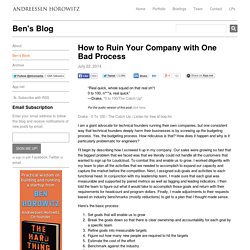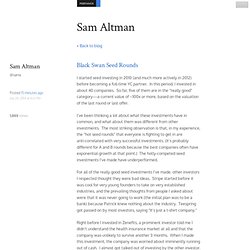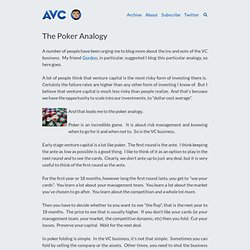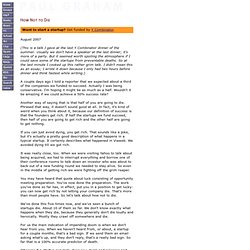

Board Observers Weekly - July 29th, 2014. Notes from Startup School Europe (London) — The Inflexion. These notes are in progress, and will be updated as the event continues.

Follow us on Twitter: @nabeelqu and @stevedomin. More on Biz Dev Intros… How to Ruin Your Company with One Bad Process. “Real quick, whole squad on that real sh*t0 to 100, n***a, real quick”—Drake, "0 to 100/The Catch Up"For the audio version of this post click here.

Drake - 0 To 100 / The Catch Up | Listen for free at bop.fm I am a giant advocate for technical founders running their own companies, but one consistent way that technical founders deeply harm their businesses is by screwing up the budgeting process. Yes, the budgeting process. How ridiculous is that? How does it happen and why is it particularly problematic for engineers?
I'll begin by describing how I screwed it up in my company. Here’s the basic process: Set goals that will enable us to growBreak the goals down so that there is clear ownership and accountability for each goal by a specific teamRefine goals into measurable targetsFigure out how many new people are required to hit the targetsEstimate the cost of the effortBenchmark against the industryMake global optimizationsExecute. Black Swan Seed Rounds. I started seed investing in 2010 (and much more actively in 2012) before becoming a full-time YC partner.

In this period, I invested in about 40 companies. So far, five of them are in the “really good” category—a current value of ~100x or more, based on the valuation of the last round or last offer. I’ve been thinking a lot about what these investments have in common, and what about them was different from other investments. The most striking observation is that, in my experience, the “hot seed rounds” that everyone is fighting to get in are anti-correlated with very successful investments. (It’s probably different for A and B rounds because the best companies often have exponential growth at that point.) For all of the really good seed investments I’ve made, other investors I respected thought they were bad ideas. The one major exception is Optimizely—the prevailing sentiment was that Optimizely was going to be great, and it was a competitive seed round.
The Poker Analogy. A number of people have been urging me to blog more about the ins and outs of the VC business.

My friend Gordon, in particular, suggested I blog this particular analogy, so here goes. A lot of people think that venture capital is the most risky form of investing there is. Certainly the failure rates are higher than any other form of investing I know of. But I believe that venture capital is much less risky than people realize. And that’s becuase we have the opportunity to scale into our investments, to "dollar cost average". And that leads me to the poker analogy. How Not to Die. August 2007 (This is a talk I gave at the last Y Combinator dinner of the summer.

Usually we don't have a speaker at the last dinner; it's more of a party. But it seemed worth spoiling the atmosphere if I could save some of the startups from preventable deaths. So at the last minute I cooked up this rather grim talk. I didn't mean this as an essay; I wrote it down because I only had two hours before dinner and think fastest while writing.) A couple days ago I told a reporter that we expected about a third of the companies we funded to succeed. Another way of saying that is that half of you are going to die. If you can just avoid dying, you get rich. It was really close, too.
You may have heard that quote about luck consisting of opportunity meeting preparation. We've done this five times now, and we've seen a bunch of startups die. For us the main indication of impending doom is when we don't hear from you. I realize this will sound naive, but maybe the linkage works in both directions. Never Negotiate Piecemeal. Here’s Why. When I started my first tech company in 1999 I had pretty good tech chops and had led teams but had very little exposure to many other things that matter in a startup including sales, marketing & business development. Like most first-timers, I learned the hard way. Negotiating was a subset of every activity in a startup – it really was a way of life. Getting an office in a tight real estate market.Getting a sublet at the right terms when the market crashed.Convincing people to join your start.
And take less than their big companies paid them and with less security.Getting a recruiter to agree to work with you. And not charge you outrageous up-front fees.Persuading a journalist to write about you rather than the 1,000 other companies bugging them. As unpleasant as people find the thought of it – life is a negotiation. And most of us start with zero training. One of the big mistakes I used to make (and still sometimes do, frankly) was to negotiate piecemeal.